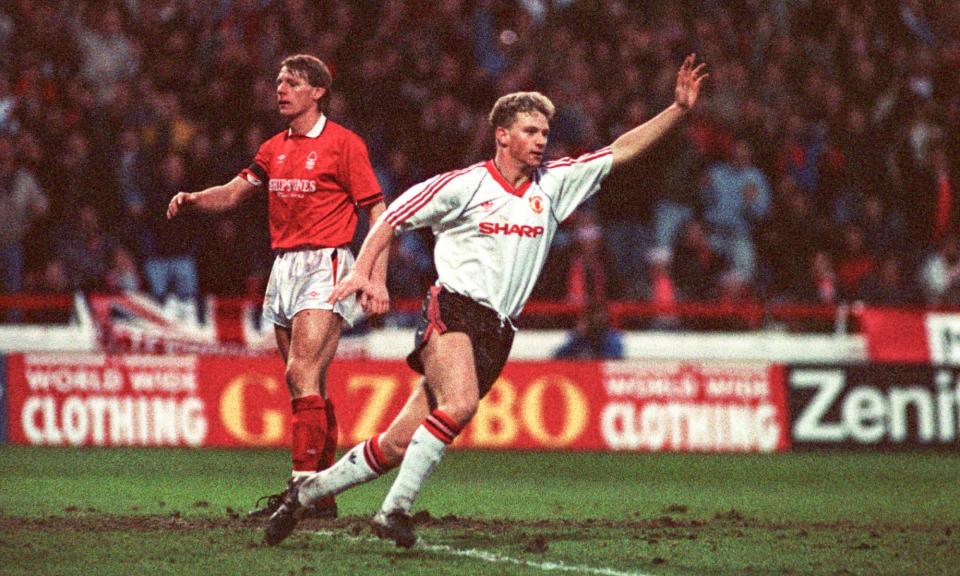‘That goal kickstarted an era’: how Mark Robins saved Alex Ferguson

Legend has it that Mark Robins saved the career of an ailing Manchester United manager in 1990. On Sunday at Wembley he could influence the future of another. When Robins was 20, amid a United run of 11 matches without a league win, Alex Ferguson hoped his young striker could provide a much-needed spark in a January FA Cup tie at Nottingham Forest – and it worked.
United went on to beat Crystal Palace in an FA Cup final replay and 34 years later Robins will lead Coventry against his former club in the semi-finals. Winning the competition arguably rescued Ferguson’s job in a season when United finished 13th in the First Division. The then chairman, Martin Edwards, always denied Ferguson was on the brink but the results were grim. A loss at the City Ground could have proven fatal but local boy Robins ensured United marched on.
Related: FA Cup replays backlash, Nagelsmann extends Germany deal: football news – live
“Everyone was struggling at the time; results weren’t great and attendances were dropping so there were a lot of things that weren’t positive but cup games gave us a route out of it,” says the former United defender Mike Duxbury, who came off the bench in the Forest game.
Ferguson was just over three years into his tenure and it had been four seasons since United had won a major trophy. The Scot led the team to second in 1988 but followed that with an 11th-placed finish and the mediocrity continued. There was plenty of talent in the squad: Mark Hughes, Brian McClair, Gary Pallister, Paul Ince and Steve Bruce were among those who went on to win the Premier League under Ferguson but as a new decade began, they were yet to find rhythm.
“We felt it was a massive game because we’d struggled a little bit leading up to it,” says the former United defender Mike Phelan, who started in midfield at the City Ground. “There was a lot of talk about Alex being under pressure but we were not thinking about that, we were focused on the game and how important it was for us in general to get some momentum.”
United were allowed 90 minutes to forget they were 15th in the table when they kicked off at Forest. Ashton-born Robins, who turned 20 a fortnight before, had progressed through the United youth ranks, becoming a regular scorer for the youth and reserve teams to catch Ferguson’s eye. He made his first-team debut in October 1988 but had to wait more than a year to get a run of games.
“Being young and excitable as a player, he wanted to make his mark,” Phelan says of Robins. “It was not often that youngsters would get their chance in the United team, which at that time had some seriously talented players in there even though we weren’t performing as well as we should. From the manager’s point of view, he was a great risk-taker – even if they were calculated, and when you need goals in the team, you put a goalscorer in and Robins had a reputation for scoring goals. He was a quiet and unassuming kid but you do not expect them to be too blasé, you expect them to come and put their head down, wanting to impress, which he did with the goal.”
Robins’ moment arrived in the 56th minute when Hughes collected a pass from Lee Martin, who would score the winner in the FA Cup final replay four months later, took a touch and lifted a pass into the box with the outside of his right foot. Robins showed his goalscorer instinct to get in front of Stuart Pearce and nod the bouncing ball home.
“It gave us belief,” says Phelan of the win. Hereford, Newcastle and Sheffield United were seen off in the next three rounds before Robins won a semi-final replay against Oldham at Maine Road. “It was my first year there,” Phelan says. “We started the season reasonably well but we faded a little bit and then all the outside noise crept in, hearing about how we were not as good as this team or that team in United’s history. Those comments do not leave you until you start performing and winning games. Certain results at certain times are pivotal to your belief in what you can achieve. From that big moment, it did cement the players after showing we had grit and determination.”
The Cup Winners’ Cup was lifted the following season and Ferguson’s reign barely stuttered in the 23 years after that cold day on the banks of the Trent. “History has proven that the goal kickstarted the Ferguson era,” says Duxbury.
Robins’ United career did not enjoy the same level of progression as Ferguson’s, and he left in 1992 for Norwich with a few medals and cult status. He has a chance to add another chapter to the history books, and Erik ten Hag’s future may look less rosy than ever if Robins triumphs again.

